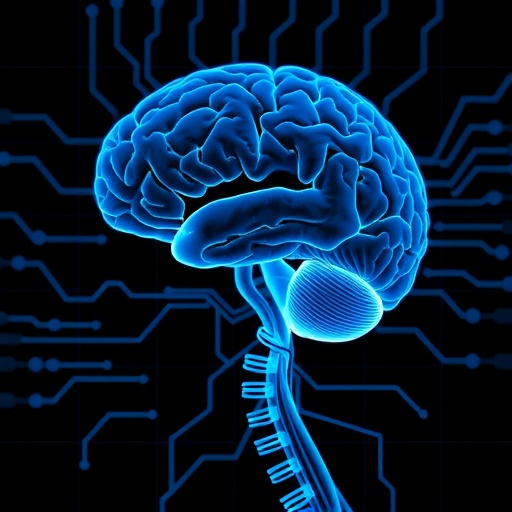Recent research has revealed significant insights into the effects of repetitive transcranial magnetic stimulation (rTMS) on learning and memory cognitive functions, particularly in subjects with vascular cognitive impairment. This groundbreaking study conducted by Wang and Gao has shown that rTMS can serve as a valuable intervention, potentially enhancing cognitive capacities in animal models specifically designed for vascular cognitive impairments. Such cognitive impairments represent a growing concern, as they can impede the quality of life and functional independence of affected individuals.
Vascular cognitive impairment occurs due to insufficient blood flow to the brain, resulting in a decline in cognitive functions such as memory, attention, and processing speed. The implications of these cognitive declines are immense, as they can have profound effects on daily living and the overall well-being of individuals. Understanding the mechanisms underlying these impairments is critical for the development of targeted interventions. This study scrutinizes how rTMS can modulate these cognitive deficiencies and what neurological pathways are involved in this process.
In their study, Wang and Gao utilized a well-established animal model to simulate vascular cognitive impairment. This model is crucial for investigating the neurophysiological underpinnings of cognitive decline while testing innovative therapeutic strategies such as rTMS. The authors meticulously designed their experiments to evaluate the performance of the subjects in various learning and memory tasks, enabling them to gauge cognitive function comprehensively before and after applying rTMS.
The electrical stimulus from rTMS is non-invasive and can penetrate the cortical areas of the brain, making it an appealing intervention for enhancing neuroplasticity and cognitive recovery. The study reported that the application of rTMS resulted in marked improvements in several cognitive tasks, suggesting that this method could induce neuroplastic changes beneficial for recovery in cognitive function. Observations indicated changes in neuronal connectivity and neurogenesis, highlighting rTMS’s potential as a facilitator of brain repair mechanisms.
Neuroimaging techniques were employed throughout the study to validate the behavioral findings observed in the rats. The authors utilized magnetic resonance imaging (MRI) to capture structural changes in the brain post-intervention, revealing significant changes in regions associated with memory and learning functions. This data reinforces the emerging understanding that rTMS does not merely have a behavioral impact but also induces measurable neural modifications.
Furthermore, the field of neuroscience has been increasingly focused on neuroinflammation’s role in cognitive decline, particularly concerning vascular cognitive impairment. Wang and Gao’s research highlights how rTMS may intersect with inflammatory pathways, suggesting a reduction in neuroinflammatory markers following treatment. This aspect underscores the need for considering neuroinflammation in developing therapeutic strategies for cognitive impairments, as addressing the inflammatory component could enhance intervention efficacy.
A critical part of the study was devoted to exploring the underlying neural induction mechanisms engaged by rTMS. The results pointed toward alterations in neurotransmitter levels, particularly acetylcholine, which is essential for learning and memory. The modulation of these neurotransmitter systems is likely to influence synaptic plasticity, providing a potential biochemical basis for the cognitive improvements observed in subjects post-treatment.
As with any emerging treatment, it is crucial to address the potential side effects or limitations associated with rTMS. While the findings from Wang and Gao offer promising results, they also stress the importance of long-term studies to understand the full range of rTMS effects on cognitive functions over extended periods. Evaluating the longevity of cognitive improvements and understanding possible adverse effects would further validate the adoption of rTMS as a routine therapeutic strategy.
The implications of this study extend beyond animal models and could herald a new frontier in treating cognitive decline in humans. While much remains to be explored regarding the safety and effectiveness of rTMS in clinical populations, initial findings are encouraging. Researchers advocate the need for human clinical trials to ascertain the effectiveness of rTMS interventions, aiming to translate the successes observed in animal studies into tangible benefits for individuals suffering from vascular cognitive impairment.
Moreover, considering the aging population and increased prevalence of cognitive impairments globally, therapies like rTMS could fill an essential gap in available treatments. Its non-invasive nature presents a significant advantage, and if proven effective in humans, it could lead to improving overall cognitive health and quality of life for individuals facing these challenges.
In conclusion, the study by Wang and Gao serves as a pivotal step towards understanding and addressing vascular cognitive impairments through innovative approaches like repetitive transcranial magnetic stimulation. Their findings contribute to a growing body of literature advocating for the integration of neuromodulation techniques in treating cognitive deficits, emphasizing the potential for future research to expand on these promising results. As scientists continue to unravel the complexities of cognitive function, rTMS may ultimately emerge as a cornerstone in the battle against cognitive decline.
The path forward should involve collaborative efforts across neuroscience and clinical disciplines to refine rTMS protocols and maximize their therapeutic impact. Researchers and practitioners are encouraged to come together to enhance knowledge-sharing and develop rigorous frameworks for trialing such interventions in diverse populations. The potential to reverse the tide of cognitive decline may hinge upon initiatives like these, making studies like that of Wang and Gao incredibly pivotal in steering research and treatment strategies toward better outcomes for all those affected.
Subject of Research: Effects of repetitive transcranial magnetic stimulation on cognitive functions in vascular cognitive impairment.
Article Title: Effects of repetitive transcranial magnetic stimulation on learning and memory cognitive function in rats with vascular cognitive impairment and its neural induction mechanism.
Article References:
Wang, J., Gao, H. Effects of repetitive transcranial magnetic stimulation on learning and memory cognitive function in rats with vascular cognitive impairment and its neural induction mechanism.
BMC Neurosci 26, 24 (2025). https://doi.org/10.1186/s12868-025-00933-z
Image Credits: AI Generated
DOI: https://doi.org/10.1186/s12868-025-00933-z
Keywords: Repetitive transcranial magnetic stimulation, cognitive impairment, memory, neuroplasticity, neural mechanisms.




